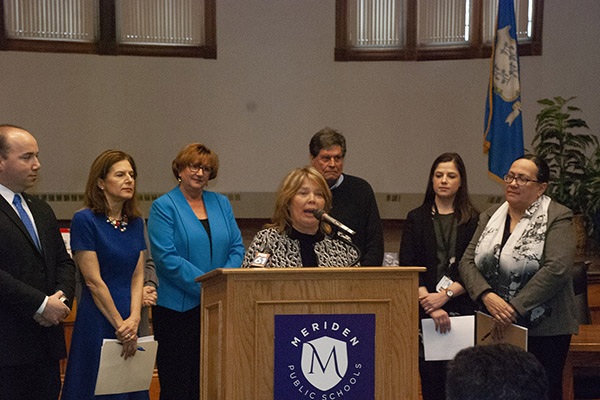Senator Abrams, Meriden Delegation, Lieutenant Governor and Secretary of the State Emphasize Importance of an Accurate 2020 Census

State Senator Mary Abrams, center, speaks Thursday on the importance of the 2020 Census for Meriden and Connecticut. From left: Lieutenant Governor Susan Bysiewcz, State Representative Cathy Abercrombie, State Representative Emil “Buddy” Altobello New York Region Assistant Census Manager Lisa Moore and State Representative Hilda Santiago.
MERIDEN, CT – Today, State Senator Mary Daugherty Abrams (D- Meriden, Middlefield, Rockfall, Middletown, Cheshire) joined a coalition of legislators including Lieutenant Governor Susan Bysiewicz, Secretary of the State Denise Merrill, State Representatives Hilda Santiago (D-Meriden), Cathy Abercrombie (D-Meriden) and “Buddy” Altobello (D-Meriden), and Meriden Mayor Kevin Scarpati, to emphasize the importance of making sure every Meriden resident, and every state resident, is properly represented in the 2020 Census. Thursday was the kickoff of 2020 Census efforts in Meriden, roughly one year before the national campaign begins.
“The message we need to get out to our community is that ‘you count,’ so make sure that you count,” said Sen. Abrams. “The Census affects so many things that we want in our community, and that we need here, so it’s very important that we come together. I’m very excited we’re getting this campaign started a year in advance with so many stakeholders getting involved.”
“There is a huge amount of federal funding at stake for Connecticut. Last year, we received $10.8 billion from the federal government. For every person we undercount, we lose $2,900. Some of the programs directly affected are the WIC program, the SNAP program, energy assistance, school programs, Head Start programs, all important for Meriden,” said Lt. Gov. Bysiewicz. She added starting Census efforts in Meriden is important because “Meriden is one of the places in our state designated as a hard-to-count area. There are areas in Meriden where there is a transient population, people move frequently, and it makes it harder to reach out to those individuals and families.”
“There’s another really important element to the Census,” Lt. Gov. Bysiewicz said. “Governor Lamont and I want to get economic growth going in Connecticut. The best way to help that growth is to count every person because, every day, people who are real estate developers and businesspeople look at that data to decide if they want to bring business to Meriden, if they want to bring housing. This is so very critical.”
“Today, more than ever, we must make every possible effort to ensure that every resident living in the state is accurately counted in the 2020 Census,” said Rep. Santiago. “If we do not, we stand to lose critical federal funding for vital services for our residents that we rely on. The ripple effects of an inaccurate count would be felt for years to come. Our main goal is to reach every resident in Meriden and ensure people understand failing to fill out the Census form will negatively impact our federal funding for programs including Section 8 housing, Medicaid and Medicare, food programs like SNAP, education, and so much more.”
“The real work will rest with local communities,” said Secretary Merrill, who noted the Census doesn’t just impact federal programs but has a direct effect on national factors including political subdivision redistricting. “In the past, we have either gained or lost Congressional representation based on the count of our communities.”
Secretary Merrill noted this will be the first year the Census will be available online
“I don’t think we can say enough how important the Census is,” Rep. Abercrombie said. “Everybody is a partner. We have the Housing Authority, the library and the school district helping, and I’m so happy we’re starting this a year before, not at the last minute. The dollars that come to this community are based on the Census.”
“We need to know you’re here, you need to be counted, so we can then take advantage of helping different initiatives and programs to bring them back to our community,” said Mayor Scarpati.
Lt. Gov. Bysiewcz and Rep. Santiago added that federal discussions about adding a citizenry checkbox to the Census shouldn’t stop anyone from filling out the form.
“We have a federal administration that wants to add a checkbox to the federal Census form that asks if you are a citizen,” Lt. Gov. Bysiewcz said. “Since 1790, we have been completing Census information without that checkbox. We want to get the message out to undocumented people across the state that you should not feel afraid to come forward, as federal law prohibits anyone from getting access to that personal information.”
“We can’t allow the negative national rhetoric effect residents’ participation in our town. We must also break through the fear of some residents about answering the Census and assure them they will not be putting themselves or other families in danger by participating,” said Rep. Santiago.
More information about the 2020 Census efforts, including how members of the public can work as Census employees and about the new phone and internet options, can be found at www.census.gov and www.2020census.gov/jobs.
